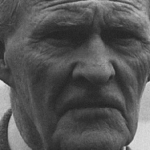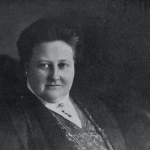The messenger runs, not carrying the news
of victory, or defeat; the messenger, unresting,
across the turning back of earth, leaving
his tracks across the plains, his ropes
hanging from the ledges of mountains;
for centuries, millennia, he has been running
carrying whatever it is that cannot be
put down: it is rolled in a tube
made of hide, carefully, to keep it dry
as he runs, through storms and monsoons,
sometimes on foot, sometimes poling a boat
through a flooded mangrove swamp, or
setting stiff sails to cross from island to island
running before the wind. In some ages, peasants
have helped him—bringing him small cakes
of rice wrapped in the weeds of the sea and
new sandals woven of hemp for his torn
bleeding feet; sometimes in the heat of noon
they would offer a drink of rosewater, sometimes
a coat of fur against the winter snows;
and sometimes at night, he would rest
by a fire where voices wove with the music
of gut-strings, or with mountain pipes whose
sound was like wind through the bones
of creation—and he would be cheered
by the company of others, the firelit glow
of their faces like a bright raft afloat in the dark;
at times, rumors spread of his death, scholars
analyzed his obsession, dated his bones, his prayer bundle;
but at dawn, he always arose, in the mists,
in the blur of so many mornings, so many shoes
worn into scraps and discarded, so many
the cities that burned as he passed
them, so many the skulls abandoned
by armies, so many whose blood
stained the threads of their prayer rugs,
so many, so many, so many—
oh,
and that green, sunlit hill that kept
rising from the dark waters of flood, outlined bright
against the sky, the odds, the evidence—
and he, the messenger,
running through history, carries this small tube,
its durable hide—carries it, not like
a torch, no, nothing so blazing;
not like the brass lamp that summons
a genie, no magic wishes;
not like the candles that hope sets aflame
and a breath can extinguish ...
no.
He carried it like
what has no likeness,
what is curled up inside and
he swore he could feel it, though
perhaps he had dreamed it, still
at times, stopping under some tree
or other, when the night was warm,
so close the stars seemed to breathe in
the branches, he would lie quiet,
then it would seem
that whatever it was in there
would pulse softly with light, a code
only the heart could break
(but of course he couldn’t say
for he was only the messenger)—
and at sunrise, wearily, he would rise
to his feet and trudge on, sometimes
running, sometimes stumbling,
carrying whatever it was that could not
be put down, would not be cast aside—
and besides, he would chide himself,
weren’t they all as tired as he,
and hadn’t they helped him, time
and again, on his way?


















Comment form: